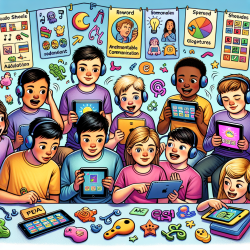Introduction
In the dynamic field of global health education, the collaborative program between Cornell University and Kilimanjaro Christian Medical University College (KCMUCo) stands as a beacon of innovation and success. The program, detailed in the research article titled ‘Pamoja Tunaweza’: A Collaborative Program Model for Global Health Training & Education, offers valuable insights for practitioners aiming to enhance their skills and impact in the field of speech language pathology. By embracing the principles and methodologies outlined in this program, practitioners can foster improved outcomes for children and communities worldwide.
Key Takeaways from the Collaborative Program
The Cornell-KCMUCo partnership has been a model of success due to its focus on experiential learning, cross-cultural collaboration, and the development of critical thinking skills. Here are some key takeaways that practitioners in speech language pathology can apply:
- Experiential Learning: The program emphasizes hands-on learning experiences that go beyond traditional didactic methods. For speech language pathologists, incorporating experiential learning can mean engaging children in real-world communication scenarios, thereby enhancing their practical skills.
- Cross-Cultural Collaboration: The partnership between institutions from different cultural backgrounds highlights the importance of understanding diverse perspectives. Practitioners can benefit from this by collaborating with colleagues from various cultural settings to develop more inclusive and effective therapy approaches.
- Critical Thinking Development: Encouraging critical thinking among students is a cornerstone of the program. Speech language pathologists can foster this skill in children by presenting them with problem-solving tasks and encouraging reflective thinking about their communication strategies.
Implementing Collaborative Learning in Speech Language Pathology
To translate the successes of the Cornell-KCMUCo program into speech language pathology practice, consider the following strategies:
- Interdisciplinary Teams: Form teams that include not only speech language pathologists but also educators, psychologists, and other relevant professionals. This mirrors the program's approach of bringing together diverse expertise to tackle complex health issues.
- Community Engagement: Engage with local communities to understand their unique needs and tailor interventions accordingly. This approach aligns with the program's emphasis on addressing local health challenges through collaborative efforts.
- Reflective Practices: Incorporate reflective practices into your routine. Encourage children to reflect on their communication experiences and progress, fostering a deeper understanding of their abilities and areas for growth.
Encouraging Further Research
The success of the Cornell-KCMUCo program underscores the importance of ongoing research and innovation in global health education. Practitioners in speech language pathology are encouraged to engage in further research to explore new methodologies and interventions that can enhance communication outcomes for children. By staying informed about the latest research and collaborating with academic institutions, practitioners can contribute to the advancement of the field.
Conclusion
The collaborative program model presented in the ‘Pamoja Tunaweza’ article offers a wealth of insights for practitioners in speech language pathology. By embracing experiential learning, cross-cultural collaboration, and critical thinking, practitioners can enhance their skills and create meaningful outcomes for children. For those interested in delving deeper into the research, the original paper provides a comprehensive overview of the program's methodology and successes.
To read the original research paper, please follow this link: ‘Pamoja Tunaweza’: A Collaborative Program Model for Global Health Training & Education.










